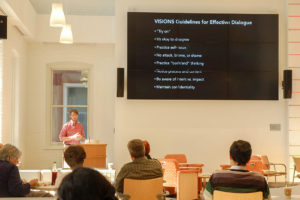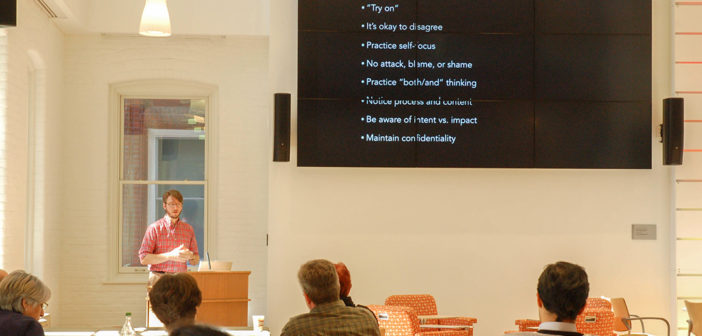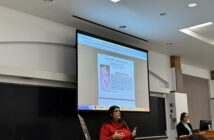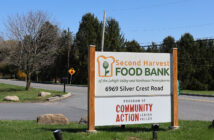Walk in to a Tackling Tough Topics Together discussion session, and the room will be abuzz with conversation. At this new series, hosted by the Council for Equitable Community, members from diverse corners of the Lehigh community come together to practice talking about topics that might not commonly arise in other day-to-day interactions.
“Every time something happens on campus, or in the world, there’s an email that goes out saying that we need to have some dialogue,” said psychology professor Christopher Burke, a member of the CEC education and dialogue working group that organized the event. “But we don’t have dialogue. People don’t talk about these topics because they’re difficult.”
At the first session Oct. 14, participants discussed the topic of identity. Some 25 Lehigh students, faculty, staff and affiliates paired off into small groups to discuss the various identities that define them and misconceptions others might have about those identities.

Psychology Professor Christopher Burke facilitates the Tackling Tough Topics Together event by discussing the guidelines for effective dialogue on Friday, Oct. 14, 2016 in Williams Hall. The discussion began with an overview of eight “Guidelines for Effective Dialogue”, which “create a safe environment where good discussions can flow”. (Ashley Quidolit/B&W Staff)
Jessica Liu, a graduate student who attended the event, said she valued the conversation she had because it enabled her to learn about others’ diverse experiences firsthand.
“There’s a lot of talking about diversity, and talking about talking about diversity,” Liu said. “It was good to have an open discussion about thought-provoking and personal experiences that wasn’t intellectualized or theoretical.”
According to preliminary findings from last year’s campus climate survey, different groups on campus are having vastly different experiences at Lehigh.
“Faculty, staff and students all have different experiences on our campus — some good, some not so good,” said Angela Scott Ferencin, the chair of the education and dialogue working group. “Opportunities to productively and respectfully discuss issues of concern will only be of benefit to the community overall.”
Rabbi Danielle Stillman, another member of the CEC, said there are many resources on campus that funnel people into the groups with which they’re most comfortable. Burke said limited interactions between groups of people reflect a broader phenomenon in American culture.
“When there’s a certain level of foundational inter-group tensions, there are then barriers to engaging in these cross-group interactions,” Burke said. Tackling Tough Topics Together allows people to learn about others’ experiences they might have never otherwise been exposed to.
To create a safe space for these kinds of conversations, Burke began the session by introducing a set of eight Guidelines for Effective Dialogue, adapted from multicultural and inclusion training workshops by VISION Incorporated. For example, one guideline suggests thinking in terms of “both/and” instead of “either/or” when encountering an opposing viewpoint. Another encourages creating space for healthy disagreement, which comes after listening thoughtfully to alternative points of view.
Liz Hill, a CEC member who attended the event, said the guidelines provide a set of tools to counter the fear and hesitation that may prevent many people from having difficult conversations.
“The guidelines create a safe environment where good discussions can flow,” Hill said. “It can create a ripple effect.”
Stillman agreed, emphasizing that talking about difficult issues is a skill that requires practicing. The first guideline, which encourages people to “try on” new ideas and give them a chance, applies to the discussions themselves — people might not come to the discussion knowing how to approach a sensitive topic, but the guidelines can help them try on different approaches.
Pooyan Doozandeh Masooleh, an international graduate student who attended the event, said he appreciated having the opportunity to discuss cultural differences with a Lehigh staff member.
“Many people just have general ideas about what other cultures are like,” Masooleh said. “But when they meet a person from that country and go through the details of that culture, they find that many of their preconceptions were distorted or wrong.”
Masooleh said he plans to use some of the guidelines for effective dialogue to facilitate group discussions in his seminar classes. Liu also has plans to take what she learned at Tackling Tough Topics Together and use it as part of a professional development workshop she is planning about communication and diversity.
Tackling Tough Topics Together is one of multiple venues for dialogue that have been initiated on campus. The Global Union’s Pushing the Envelope series about international issues, and the Multifaith Initiative’s interfaith religious dialogue are also providing opportunities to discuss sensitive issues.
The Tackling Tough Topics Together series will continue throughout the semester.
Stillman and Hill both said with the lead-up to the presidential election, discussions like these provide an outlet for people to address tensions that may be bubbling beneath the surface.
Hill said having these conversations makes talking about these issues less awkward and more casual and habitual. She said this helps to improve the overall climate.
“There’s a lot of energy right now reacting to the greater world,” Stillman said. “We don’t live in a bubble here, so let’s talk about it. Let’s not just pretend it doesn’t affect us.”






Comment policy
Comments posted to The Brown and White website are reviewed by a moderator before being approved. Incendiary speech or harassing language, including comments targeted at individuals, may be deemed unacceptable and not published. Spam and other soliciting will also be declined.
The Brown and White also reserves the right to not publish entirely anonymous comments.